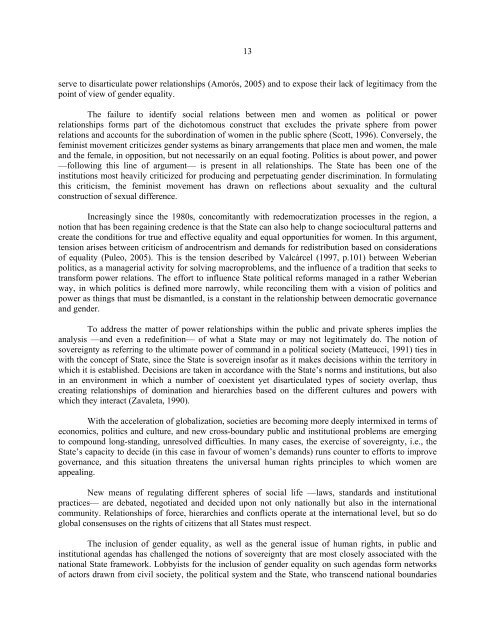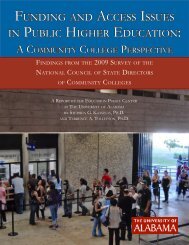Women in Latin America and the Caribbean - Cepal
Women in Latin America and the Caribbean - Cepal
Women in Latin America and the Caribbean - Cepal
You also want an ePaper? Increase the reach of your titles
YUMPU automatically turns print PDFs into web optimized ePapers that Google loves.
13<br />
serve to disarticulate power relationships (Amorós, 2005) <strong>and</strong> to expose <strong>the</strong>ir lack of legitimacy from <strong>the</strong><br />
po<strong>in</strong>t of view of gender equality.<br />
The failure to identify social relations between men <strong>and</strong> women as political or power<br />
relationships forms part of <strong>the</strong> dichotomous construct that excludes <strong>the</strong> private sphere from power<br />
relations <strong>and</strong> accounts for <strong>the</strong> subord<strong>in</strong>ation of women <strong>in</strong> <strong>the</strong> public sphere (Scott, 1996). Conversely, <strong>the</strong><br />
fem<strong>in</strong>ist movement criticizes gender systems as b<strong>in</strong>ary arrangements that place men <strong>and</strong> women, <strong>the</strong> male<br />
<strong>and</strong> <strong>the</strong> female, <strong>in</strong> opposition, but not necessarily on an equal foot<strong>in</strong>g. Politics is about power, <strong>and</strong> power<br />
—follow<strong>in</strong>g this l<strong>in</strong>e of argument— is present <strong>in</strong> all relationships. The State has been one of <strong>the</strong><br />
<strong>in</strong>stitutions most heavily criticized for produc<strong>in</strong>g <strong>and</strong> perpetuat<strong>in</strong>g gender discrim<strong>in</strong>ation. In formulat<strong>in</strong>g<br />
this criticism, <strong>the</strong> fem<strong>in</strong>ist movement has drawn on reflections about sexuality <strong>and</strong> <strong>the</strong> cultural<br />
construction of sexual difference.<br />
Increas<strong>in</strong>gly s<strong>in</strong>ce <strong>the</strong> 1980s, concomitantly with redemocratization processes <strong>in</strong> <strong>the</strong> region, a<br />
notion that has been rega<strong>in</strong><strong>in</strong>g credence is that <strong>the</strong> State can also help to change sociocultural patterns <strong>and</strong><br />
create <strong>the</strong> conditions for true <strong>and</strong> effective equality <strong>and</strong> equal opportunities for women. In this argument,<br />
tension arises between criticism of <strong>and</strong>rocentrism <strong>and</strong> dem<strong>and</strong>s for redistribution based on considerations<br />
of equality (Puleo, 2005). This is <strong>the</strong> tension described by Valcárcel (1997, p.101) between Weberian<br />
politics, as a managerial activity for solv<strong>in</strong>g macroproblems, <strong>and</strong> <strong>the</strong> <strong>in</strong>fluence of a tradition that seeks to<br />
transform power relations. The effort to <strong>in</strong>fluence State political reforms managed <strong>in</strong> a ra<strong>the</strong>r Weberian<br />
way, <strong>in</strong> which politics is def<strong>in</strong>ed more narrowly, while reconcil<strong>in</strong>g <strong>the</strong>m with a vision of politics <strong>and</strong><br />
power as th<strong>in</strong>gs that must be dismantled, is a constant <strong>in</strong> <strong>the</strong> relationship between democratic governance<br />
<strong>and</strong> gender.<br />
To address <strong>the</strong> matter of power relationships with<strong>in</strong> <strong>the</strong> public <strong>and</strong> private spheres implies <strong>the</strong><br />
analysis —<strong>and</strong> even a redef<strong>in</strong>ition— of what a State may or may not legitimately do. The notion of<br />
sovereignty as referr<strong>in</strong>g to <strong>the</strong> ultimate power of comm<strong>and</strong> <strong>in</strong> a political society (Matteucci, 1991) ties <strong>in</strong><br />
with <strong>the</strong> concept of State, s<strong>in</strong>ce <strong>the</strong> State is sovereign <strong>in</strong>sofar as it makes decisions with<strong>in</strong> <strong>the</strong> territory <strong>in</strong><br />
which it is established. Decisions are taken <strong>in</strong> accordance with <strong>the</strong> State’s norms <strong>and</strong> <strong>in</strong>stitutions, but also<br />
<strong>in</strong> an environment <strong>in</strong> which a number of coexistent yet disarticulated types of society overlap, thus<br />
creat<strong>in</strong>g relationships of dom<strong>in</strong>ation <strong>and</strong> hierarchies based on <strong>the</strong> different cultures <strong>and</strong> powers with<br />
which <strong>the</strong>y <strong>in</strong>teract (Zavaleta, 1990).<br />
With <strong>the</strong> acceleration of globalization, societies are becom<strong>in</strong>g more deeply <strong>in</strong>termixed <strong>in</strong> terms of<br />
economics, politics <strong>and</strong> culture, <strong>and</strong> new cross-boundary public <strong>and</strong> <strong>in</strong>stitutional problems are emerg<strong>in</strong>g<br />
to compound long-st<strong>and</strong><strong>in</strong>g, unresolved difficulties. In many cases, <strong>the</strong> exercise of sovereignty, i.e., <strong>the</strong><br />
State’s capacity to decide (<strong>in</strong> this case <strong>in</strong> favour of women’s dem<strong>and</strong>s) runs counter to efforts to improve<br />
governance, <strong>and</strong> this situation threatens <strong>the</strong> universal human rights pr<strong>in</strong>ciples to which women are<br />
appeal<strong>in</strong>g.<br />
New means of regulat<strong>in</strong>g different spheres of social life —laws, st<strong>and</strong>ards <strong>and</strong> <strong>in</strong>stitutional<br />
practices— are debated, negotiated <strong>and</strong> decided upon not only nationally but also <strong>in</strong> <strong>the</strong> <strong>in</strong>ternational<br />
community. Relationships of force, hierarchies <strong>and</strong> conflicts operate at <strong>the</strong> <strong>in</strong>ternational level, but so do<br />
global consensuses on <strong>the</strong> rights of citizens that all States must respect.<br />
The <strong>in</strong>clusion of gender equality, as well as <strong>the</strong> general issue of human rights, <strong>in</strong> public <strong>and</strong><br />
<strong>in</strong>stitutional agendas has challenged <strong>the</strong> notions of sovereignty that are most closely associated with <strong>the</strong><br />
national State framework. Lobbyists for <strong>the</strong> <strong>in</strong>clusion of gender equality on such agendas form networks<br />
of actors drawn from civil society, <strong>the</strong> political system <strong>and</strong> <strong>the</strong> State, who transcend national boundaries











